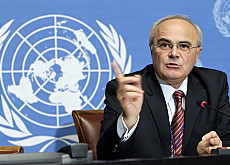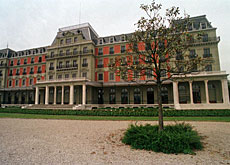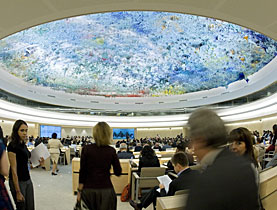Swiss weigh in on Human Rights Council debate

Amid attacks and praise for the Human Rights Council, Switzerland has called for a special meeting to step up debate on the United Nations body.
A review of the council’s working methods is due to take place in 2011, and with the 13th regular session underway in Geneva, delegations have been giving their verdicts this week on what needs to be addressed next year.
Switzerland, the initiator of the council back in 2006, took to the podium to offer its own critique, while also announcing it would be holding a special meeting on the issue in Montreux on April 20, open to all foreign missions in Geneva, UN representatives and the High Commissioner for Human Rights.
“The seminar aims to discuss in an open and informal manner the different aspects of the 2011 review of the council, before the formal process begins this autumn,” Nadine Olivieri Lozano, a spokeswoman for the Swiss foreign ministry, told swissinfo.ch.
On the issue, Swiss Foreign Minister Micheline Calmy-Rey told a ministerial meeting of the council: “Let’s not spend all of our energy renewing the council.”
She agreed the problematic council had “not yet been able to deploy its full potential,” adding that Switzerland wanted a “council that responds to the needs of victims and vulnerable groups”.
More specifically the council needed to encourage universal respect for independent rapporteurs, who were coming increasingly under attack for unfavourable reports and were often refused visits by states.
Culture of confrontation
Among the countries to opine about the council, Bahrain described it as a “qualitative leap” in the field of human rights and Yemen said it was “always at the forefront” of the struggle for protecting human rights. Both countries’ human rights track records are criticised by Amnesty.
Botswana however was “deeply concerned” at its lack of progress in countering racism, while Brazil noted that one of its basic challenges would be overcoming a culture of confrontation and selectivity.
Most had praise for the council’s Universal Periodic Review (UPR), a process by which all 192 members of the UN are scrutinised by other countries on their own track records.
Non-governmental organisations are among the fiercest critics of the council, many believing the council is controlled by a bloc of Islamic and African states who protect each other from criticism. Meanwhile, the European Union, Canada, the US and UN Secretary-General Ban Ki-moon have all said there is a disproportionate focus on Israel.
Some say as a UN organisation it is no better than its predecessor, the now defunct Commission on Human Rights.
“It’s worse,” Hillel Neuer, executive director of Geneva-based UN Watch, told swissinfo.ch.
“If we look at the discredited Commission on Human Rights, which Kofi Annan said was rife with selectivity, politicisation and credibility, [at least] you had resolutions on China. Today no one even thinks of making them.”
His organisation has compiled a “scorecard” of votes and resolutions made by the council since its creation – the results of which he will present in a council session on Monday. He says two-thirds of members have voted against human rights mechanisms or basic principles such as free speech, while over half of the resolutions were counterproductive to human rights.
“Anyone who would claim to be optimistic [about improving the council] is not being realistic. But we haven’t given up, we’re here, we want to make this work.”
US leadership
UN Watch believes that the US will need to play a key leadership role, as de facto leader of the opposition at the council, a group of 12 democracies that routinely oppose regressive measures and defend human rights positions.
“They were always historically the leader of any strong mechanism. The US absence was a contributing factor why things got worse. Now the US is back. There’s one thing that both Republicans and Democrats agree, that they want US membership on the council to hold the most serious abusers to account.”
UN Watch has called on the US to refocus the work of the council by doing just that, as well as defending the rights of NGOs, opposing the election of violators to the council and strengthening the UPR.
“There are some very good things in the council and there are some things that are going very badly,” commented Peter Splinter, Amnesty International’s representative to the United Nations in Geneva.
“Our major criticism is that this council isn’t looking at situations of serious human rights violations whether they’re acute or in places like Iraq, Afghanistan, Iran, Zimbabwe where they are chronic and have been going on for a long time.”
There is also a trend in the council to try to intimidate independent and NGO voices, with some losing their accreditation, and talk of the need for rules to regulate NGO conduct, he said.
On the plus side, assessments by the UPR were creating domestic dialogue and countries that would not have been considered under the former commission are reviewed now as a matter of course.
But as part of the review people should first be asking if the council has achieved the mandate set out by the UN General Assembly, Splinter says.
“Before we start talking about any reform and changing the rules, let’s agree to apply the rules that have already been established.”
Jessica Dacey, swissinfo.ch
Swiss Foreign Minister Micheline Calmy-Rey presented the concept of the Human Rights Council in March 2004 to replace the widely discredited and highly politicised UN Human Rights Commission created in 1946. The UN officially accepted the idea in September 2005.
The first session of the UN Human Rights Council took place in June 2006 at its headquarters in Geneva. The council reports directly to the UN General Assembly.
It consists of 47 member states, which are selected with absolute majority by the UN General Assembly. It meets at least three times a year and can also hold special meetings to discuss crisis situations.
The 27 seats of African and Asian countries heavily outvote western countries, which hold seven seats on the council.
Switzerland was one of 47 countries to sit on the council from 2006-2009 but is now just an observer for one year. The country has applied to be a full member from 2010-2013. The UN General Assembly will vote on the matter in May.
A resolution of the UN General Assembly creating the council called for two review processes of the council in 2011. In one the council was asked to review its working methods and functioning after five years. The second review in New York will assess the status of the council and whether it should be a principle body of the UN like the General Assembly.
One of the council’s duties is to conduct a Universal Periodic Review of all 192 members of the UN to scrutinise their human rights records at home. Countries can only be reviewed based on the human rights treaties they have ratified.
Member states are divided into groups of about 16 countries for the procedures. During a two-week review session, a council working group looks at the human rights record for each country within that group. Each country’s review typically lasts three hours.
The records of all 192 states, regardless of their size, wealth, military or political importance, are examined using a common mechanism.

In compliance with the JTI standards
More: SWI swissinfo.ch certified by the Journalism Trust Initiative













You can find an overview of ongoing debates with our journalists here . Please join us!
If you want to start a conversation about a topic raised in this article or want to report factual errors, email us at english@swissinfo.ch.